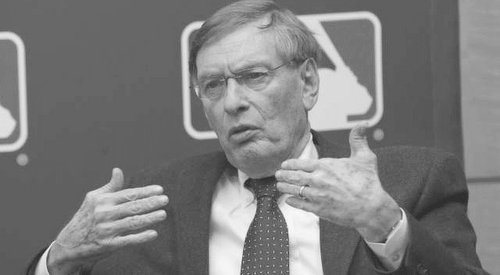
Bud Selig, Steroids and Legacies
Welcome to Stage 4 of Major League Baseball’s continuing relationship with steroids and other such performance-enhancing drugs: the Avenging Angel stage.
Stage 1 was about willful disregard and amusement 0 the late 1980s and early 1990s, when The Washington Post’s Tom Boswell was reporting about Jose Canseco’s steroid use, but the Major Leagues was far more concerned about impending labor strife. Steroids? Meh, it was a problem for the Olympics, not baseball.
Stage 2 was about promotion and hyperbole – the late 1990s and early 2000s, when androstenedione was discovered in Mark McGwire’s locker, but the viewing public was far more concerned with record-setting offensive heroics. Attendance boomed. Problems? An All-Star Game tie and competitive imbalance. There was grave concern that the New York Yankees were going to win every single World Series, while teams like Tampa Bay were doomed to perpetual misery.
[php snippet=1]
Things went wrong in the mid-2000s, moving Major League Baseball into Stage 3: Embarrassed, Awkward Absence. It began, perhaps, with Ken Caminiti’s 2002 Sports Illustrated admission of steroid use during his 1996 MVP campaign before taking off with Jose Canseco’s wild claims of widespread steroid abuse in “Juiced” (Regan Books, 2005). A Congressional hearing in 2005 included All-Star first baseman Rafael Palmeiro, who stated convincingly, “I have never used steroids. Period”. Five months later, Palmeiro reached the 3,000-hit plateau… and then tested positive for stanozolol (which he blamed on teammate Miguel Tejada). There was an increasing understanding that baseball’s best players in the previous decade, specifically Mark McGwire and Sammy Sosa, had juiced in order to better their performance. Outrage spread.
All is well, Major League Baseball pleaded, sounding much like Kevin Bacon in “Animal House”. Remain calm. The past is in the past.
It was not in the past. In 2006, Mark Fainaru-Wada and Lance Williams reported in “Game of Shadows” (Gotham, 2006) that San Francisco outfielder Barry Bonds had used designer steroids, HGH, and more in a successful effort to turn himself into the game’s premier slugger. Bonds not only held the Major League single-season record for home runs, he was quickly approaching Hank Aaron’s career record. The country was polarized. Bonds (and his ilk) were alternately praised and berated, applauded and booed. Baseball’s greatest records, it was feared, were about to belong to an exposed cheat.
Commissioner Bud Selig, who had been so humiliatingly present at the 2002 All-Star Game tie, disappeared from the public view. On Aug. 7, 2007, Bonds belted his 756th career home run, eclipsing Hank Aaron. Selig was not on hand. He chose instead to meet with former Senator George Mitchell, who was working on a study determining the extent of steroid use in the Major Leagues. The resulting Mitchell Report was released in the winter, and it tarred Roger Clemens, the generation’s finest pitcher, along with 88 other players.
In the years since, increased drug testing has been introduced. No matter, the PED scandals persist, fixing a scarlet letter upon Manny Ramirez, Alex Rodriguez, and, most recently, five-time All-Star and 2011 National League MVP Ryan Braun.
Enter Bud Selig, Avenging Angel.
No longer will Major League Baseball sit back with impotent shame, watching reporters and grand juries attempt to get to the heart of the matter, all the while potential cheaters carve their way through the record books and influence the pennant races.
Now it’s MLB itself that is actively searching out information, with Selig himself meting out the final sentence. Braun was called on the carpet first, presented with the evidence collected, and suspended for the rest of the year without pay. A harsher penalty might just await Alex Rodriguez, while the other players named in the ongoing Biogenesis investigation try desperately to keep their thoughts from flitting to their own worst-case scenarios.
It has taken decades for Major League Baseball to take this strict tact to combat PED use. (There are those who wish Selig to go farther and outright end the careers of all involved, much the same way commissioner Kenesaw Mountain Landis banned every player associated with gambling when he was brought into the sport in 1920.)
In retrospect, you get the feeling that Selig wishes now he would have treated Barry Bonds and Roger Clemens in the same way that he is currently dealing with Ryan Braun and Alex Rodriguez.
But you also get the feeling that Ryan Braun only apologized for doping because he was caught and now has to deal with the negative ramifications, same as Major League Baseball would have continued right along, disregarding abuse and promoting its enhanced players, if not forced by society to look its indiscretions in the eye.
“I realize that I have made some mistakes,” said Braun. “I am glad to have this matter behind me,” he said later. The words could have come right from Bud Selig’s mouth.
Who will be Selig’s Avenging Angel?
[php snippet=1]

